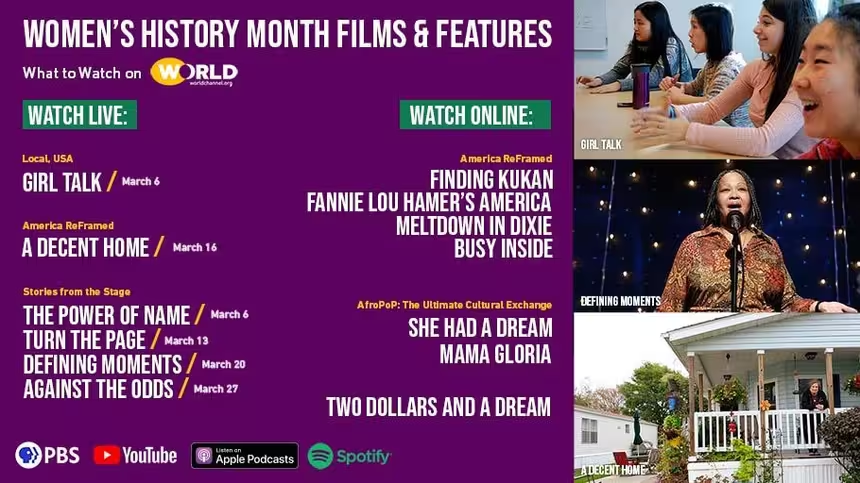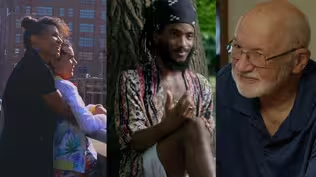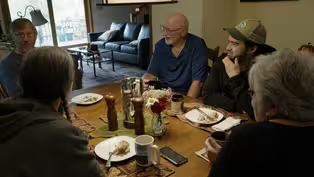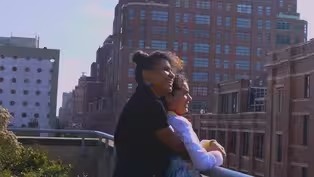WORLD Channel
The Conversation Remix: Learning to Breathe
Special | 9m 44sVideo has Closed Captions
Black men reflect on their younger selves, sharing how their ideas of racism has changed.
LEARNING TO BREATHE is the sequel to the 2015 New York Times Op-Doc 'A Conversation About Growing Up Black' where Black boys, teens, and young men shared their thoughts about race in America. Five years later, the young men return to compare and contrast how their relationships with racial justice, systemic racism, and social inequity & inequality have changed following the death of George Floyd.
Problems playing video? | Closed Captioning Feedback
Problems playing video? | Closed Captioning Feedback
Funding provided by the MacArthur Foundation.
WORLD Channel
The Conversation Remix: Learning to Breathe
Special | 9m 44sVideo has Closed Captions
LEARNING TO BREATHE is the sequel to the 2015 New York Times Op-Doc 'A Conversation About Growing Up Black' where Black boys, teens, and young men shared their thoughts about race in America. Five years later, the young men return to compare and contrast how their relationships with racial justice, systemic racism, and social inequity & inequality have changed following the death of George Floyd.
Problems playing video? | Closed Captioning Feedback
How to Watch WORLD Channel
WORLD Channel is available to stream on pbs.org and the free PBS App, available on iPhone, Apple TV, Android TV, Android smartphones, Amazon Fire TV, Amazon Fire Tablet, Roku, Samsung Smart TV, and Vizio.

Be Seen, Be Heard, Be Celebrated
Celebrate women – their history and present – in March with WORLD, appreciating the hard won battles for gender equality and recognizing how much more we all have to work toward.More from This Collection
THE CONVERSATION REMIX explores the present catharsis we are living through, following the death of George Floyd on May 25, 2020. Through three short, powerful character-driven films, we dive into how the current uprising is impacting communities, and how we can contribute to discussions about racial justice reform.
The Conversation Remix: Good White People
Video has Closed Captions
Unpacking how white people view and interact with race in America. (11m 26s)
The Conversation Remix: For Our Girls
Video has Closed Captions
Exploring the stigmas Black girls face as they grow up within and outside their community. (10m 25s)
Providing Support for PBS.org
Learn Moreabout PBS online sponsorship♪ (indistinct shouting) ♪ (flames billowing, indistinct shouting) Well, racism means... (clears throat) MILES: A race... feels that they're superior to another race.
JUMOKE: It makes you feel like your life is worth less, it really does.
I don't know, I just wish there was, like, a solution already.
♪ MILES (on recording): A large part of a race feels like they're superior to another race.
Not only do they believe that, but they act on it.
RAKESH: ♪ Probably making new (bleep), never get the credit ♪ ♪ Sliding into... My name is Rakesh, and I should be judged about what kind of person I am.
Rakesh means the sun and the moon.
♪ They don't want you, they just wanna try to... ♪ RAKESH: I think the policemen are the safest people.
I guess I had a naive perspective of racism back then.
JUMOKE: Oh, you know, cops are your friends, you're supposed to... you know, they're here to protect you-- but all I'm seeing is the opposite.
I was just looking at my expression, um... (on recording): So how can I not be afraid when I feel like I'm being hunted?
Obviously, I was very angry.
I also kind of see this subtext of longing, this real desire for things to not be this way.
Don't mind me.
The fear, the frustration, the fatigue, all brewing and boiling together, constantly bubbling at the top, always threatening to burst, but, don't erupt.
Stay... cool.
MYLES: As I got older, I saw that there's like so many different types of racism, so I think that was one of the things I would probably tell myself to look out for.
♪ JUMOKE: Imagine that, your words worth less, your life worth less.
Can you imagine the kind of rage that that would inspire?
RAKESH: ♪ And I think to myself... JUMOKE: And you were here when truth was killed.
RAKESH: ♪ What a wonderful world When I was in fifth grade, I didn't know half of this stuff that we were talking about.
(kids chattering) MADDOX: Especially in school, I feel like they find a way to sand the rough edges of slavery and other discrimination against people of color.
♪ (people shouting) DON: I felt so much of these feelings when I was kid, like...
In 6th, 7th grade, we're reading these history textbooks.
We open the page to this painting, and this is the symbol of manifest destiny.
But those of us that are Brown, that are Indigenous, that are Black, we are literally chased out of the frames of these pictures and then forced to, like, invest in that emotionally or believe in that?
All of it, when I think about it, when I sit with it, it's, like, crazy.
♪ There's a narrative that, that we're dangerous.
I mean, every day, people are getting killed, so it's, like, it's hard to be hopeful, to be honest with you.
♪ MARVIN: I can't watch another video of a Black and Brown person being murdered by police officers with impunity, I just can't do it anymore, like, I've reached a breaking point.
♪ DON: Many moments did I encounter my blackness and have to decide whether it was something to be proud of or something to be scared of.
You know, just something to have to reckon with.
♪ MILES: An interesting conversation I was having with my white friend was just the acknowledgement in the difference of our race and the impact that plays in our relationship and our lives individually.
Five years ago, I was still chasing whiteness.
I realize that that's futile now.
White supremacy has taught me that, like, the world is destined to a certain group of people.
I've worked to undo all of that.
And I have a language to address this stuff that I don't believe in.
♪ MILES: I've always been taught to think critically, to always question authority, question orthodoxy.
And I am still learning and trying to figure it out a hundred percent, but I'm understanding that... racism is a tool.
♪ DON: I have no more time to deal with chasing institutional space or, like, agency over, like, some art career that, like, really means nothing because it's all founded in a farce of an American dream that I no longer believe in.
MARVIN: Call it as you see it, but don't make your voice too loud, we don't want scare the white folk.
Even though when we scream and shout and voice our pain, many of them seem to think it's a joke, and then they want to tell us about hope... or community.
JUMOKE: It's important to name your emotions, but the naming has to be followed with the decision as well, right-- I'm angry.
What do I do about that?
♪ - There goes Malik!
Malik!
♪ I'm honestly surrounding myself with Black people.
It goes a long way to know that someone is feeling the exact same way that you're feeling.
It makes you kind of want to advocate for yourself.
It makes you understand that you have value in a way.
DON: I'm fortified in my history and my ancestry.
And I have only but one way to go from here.
♪ JUMOKE: Being in this constant state of discovery and exploration, it's really restorative for me, especially when we're living in a time of so much trauma, so much violence.
This feeling of self-determination, it kind of guides my life.
How do I want to be in the world?
How do I want to feel, what do I want to do?
♪ I think all Black people are inherently activists, in our existence is radical.
MYLES: When I was younger, I didn't really see that, and I kind of had that, that thought in my head that, "Oh, this is not my fight.
This is not my battle," but it is."
(sneakers squeaking, people cheering) MILES: I think I have a duty not only to call out anti-Blackness, but to also lift up pro-Blackness and lift up my Black peers.
♪ DON: For so long, I'd been vying for like a seat at the table.
JUMOKE: But as I've gotten older, I've realized I don't have to live in that structure.
I don't have to look at myself by how whiteness looks at me.
DON: There's all this stuff we can do on our own.
And with each other.
♪ MALIK: I came from Black people.
I got my identity from Black people and it would be disgraceful not to step up for people being oppressed.
I am included in that.
♪ JUMOKE: We're constantly finding new ways to access levels of freedom.
It's not so much about how we excel, despite all odds in this society, but how we find room to breathe, how we find room to dance, how we find room... to love.
♪ ♪

- News and Public Affairs

Top journalists deliver compelling original analysis of the hour's headlines.

- News and Public Affairs

FRONTLINE is investigative journalism that questions, explains and changes our world.












Support for PBS provided by:
Funding provided by the MacArthur Foundation.


